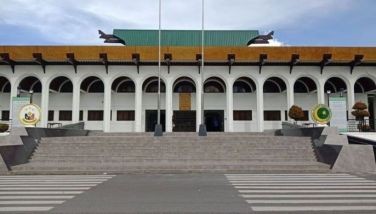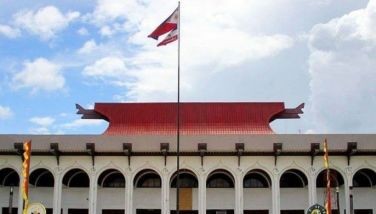Absurd measure
Filipino tobacco farmers have reportedly been strongly opposing a pending proposal in Congress to increase excise taxes on “sin” products by as much as 1,000 percent, particularly for locally produced cigarettes.
An unaware observer might ask why farmers are against the bill authored by Cavite Rep. Joseph Emilio Abaya when it proposes to allocate at least 15 percent of revenues collected under the measure for their benefit.
The measure, House Bill 5727, proposes a unitary tax rate for sin products like cigarettes and liquor. The government estimates that about P4.5 billion of the P60 billion in taxes expected to be collected under this measure would be used to help tobacco farmers shift to other crops such as tomato, sweet corn, and bitter gourd, according to the bill’s advocates.
The Department of Finance, however, has failed to explain two vital aspects of this supposedly pro-tobacco farmer proposal: how it came up with, and expects to raise, P60 billion from HB 5727, and how farmers can expect to get this windfall if and when the government fails to reach its revenue target under this measure.
Up to now, the DOF has yet to explain how it came up with its P60 billion computation, and how it would raise this amount given its estimate that higher taxes, which would naturally lead to exorbitant cigarette price hikes, would reduce consumption by 50 percent. The DOF also has to deal with the reality that extremely high tax increases on tobacco products would lead to cigarette smuggling, especially with the country’s porous borders, weak law enforcement and endemic corruption in the bureaucracy.
HB 5727 will not guarantee the government its additional P60 billion from “sin” products but could even pull down its revenue targets. It will worsen, rather than improve the plight of farmers in the country’s tobacco-producing regions. The farmers know this, which is why they are strongly opposing the Abaya bill.
Through the DOF-backed tax system of Rep. Abaya, the government aims to impose a unitary rate of P30 per pack on all tobacco products within three years of the implementation of this law.
Under the current multi-tiered tax system, a pack of premium-brand smokes retails for around P29, while a low-priced pack sells for P12. If the P30-per-pack unitary rate on all tobacco products is imposed by the government, then the tax of the more expensive premium brand will increase by only SIX percent (from P28.30 to P30). The tax rate on the low-priced, masa brand, meanwhile, will jump to almost 1,003 percent because the tax of P2.72 per pack under the current multi-tiered system will be replaced by a unitary rate of P30, which translates to a P27.28 increase.
Given these figures, a pack of premium cigarettes will now sell for P31. The low-priced brand, which used to sell for P12 per pack, will have to drastically adjust its price to compensate for the new tax adjustment. Thus, its new retail price will be around P44.75. The low-priced brand will now be more expensive than premium cigarettes!
A World Bank study has shown that in developing economies, the volume of cigarette production drops by eight percent for every 10 percent increase in prices. The bill proposes a hefty tax hike of 1,003 percent for low-priced cigarettes, which translates to a production dive by as much as 87 percent for legitimate manufacturers.
Small tobacco manufacturers and retailers, who produce and sell mid-priced cigarette brands will be wiped out as a consequence of Abaya’s absurd tax measure. Small cigarette manufacturers like La Suerte, Mighty Corp., and Associated Anglo-American Corp. will have no choice but to close shop Big cigarette manufacturers like Philip Morris Fortune Tobacco Corp. (PMFTC), if they haven’t yet moved their business elsewhere, would just manufacture high-end and premium brands.
Local tobacco farmers would be the ultimate losers because 60 percent of their produce are used to manufacture low- to mid-priced brands.
CA flip-flopping assailed
This week, Steel Corporation of the Philippines (SCP), through its VP-Corporate Legal Counsel, Atty. Nonnatus Chua, formally sought the inhibition of Justice Fernanda Lampas Peralta, chairperson of the former 14th Division of the Court of Appeals, together with the two other members of said division, namely, Justices Priscilla Baltazar-Padilla and Agnes Reyes-Carpio.
In a letter to CA Presiding Justice Andres Reyes Jr., the SCP accused the three of “manifest partiality, evident bad faith and gross inexcusable negligence” in deciding the case and promulgating the decision dated February 8, 2012 which declared as null and void the order dated June 1, 2011 of the Regional Trial Court (RTC) of Balayan, Batangas.
In the said order, the RTC of Balayan, Batangas held SCP’s panel of insurers liable to SCP and directed them to pay SCP’s insurance claims in the total amount of $42 million or, in lieu thereof, replace or reinstate SCP’s damaged equipment. The insurance companies include Mapfre Insurance Corporation, New India Assurance Company, Philippine Chapter Insurance Corp., Malayan Insurance Company and Asia Insurance Philippines Corp.
SCP noted the “indecent” haste by which the three issued the writ of preliminary injunction and shortly thereafter, the decision against SCP.
Chua, said that the fact that Peralta immediately believed the insurers’ claim that they would go bankrupt if ordered to pay without even asking them for supporting evidence showed “manifest partiality, evident bad faith and gross inexcusable negligence” on the part of the ponente. He said the falsity of the insurers’ claim was subsequently proven when one of the insurers (Standard Insurance Co. Inc.) did not join the appeal and instead, paid its corresponding share without suffering financial difficulty.
Chua likewise said that the division flip-flopped in first admitting SCP’s reply-memorandum in its resolution dated October 17, 2011 only to issue another resolution dated October 28, 2011 in which it simply “noted” its existence thereby withdrawing what it had previously granted.
He emphasized that the litany of Peralta’s bias, partiality and prejudice against SCP went on as she refused to conform to the decision dated August 11, 2010, penned by Supreme Court Justice Diosdado Peralta, her own husband, in the case of China Banking Corporation vs. Cebu Printing and Packaging Corporation.
Under said decision, the proper mode of appeal in cases involving corporate rehabilitation is through a petition for review under Rule 43 of the Rules of Court. Had the ponente done so, she would have dismissed outright the petition for certiorari filed by the panel of insurers under Rule 65 of the 1997 Revised Rules of Civil Procedure for being the wrong remedy or mode of appeal to question the order of the RTC of Balayan, Batangas, acting as a rehabilitation court.
Chua emphasized that the continued refusal of SCP’s insurers to settle the latter’s claim is causing SCP to incur losses not only in profits but also in market share and on account of the obsolescence and deterioration of its machineries and equipment which have remained idle. Being under corporate rehabilitation, its restoration to normal business operations and former position of financial health largely depends on the immediate replacement of its cold rolling mill, the latter being an essential part of its core manufacturing operations, he added.
For comments, e-mail at philstarhiddenagenda@yahoo.com
- Latest
- Trending




























